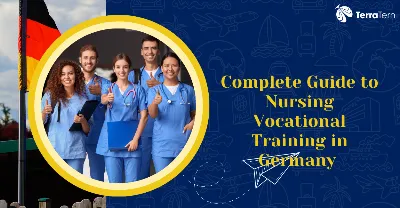Key Highlights
- What is Nursing Vocational Training in Germany? Latest Guide 2025
- Who is Eligible for Nursing Vocational Training in Germany?
- How Does the Application Process Work for International Students?
- What Will You Learn During the 3-Year Program in Germany?
- How Much Will You Earn During the Nursing Ausbildung Program in Germany?
- What Career Opportunities Await After Graduation?
- How to Succeed in Your Nursing Ausbildung Application in Germany?
- What Challenges Should You Expect During Nursing Vocational Training in Germany?
- Latest Facts and News About Nursing Vocational Training in Germany 2025
- Conclusion
Nursing vocational training in Germany is a unique 3-year professional training that combines high-quality theoretical training with comprehensive clinical practice, one of the most comprehensive healthcare training systems in Europe. Offering international students a rare opportunity to earn a degree while they study, dual education provides monthly stipends of between 1,341 and 1,503 euros during the duration of your program. To be admitted, candidates must have a secondary school diploma and have achieved B1-B2 proficiency in the German language, and they must have health clearance as well.
Take your healthcare career to the next level with proven techniques and insider insights. How do I begin nursing vocational training in Germany? To start a course in nursing in Germany, you must have a secondary school qualification, a German language certificate of at least B1-B2 and a health certificate. The application process includes getting admission into a nursing school, identifying a healthcare facility to undergo practical training, and acquiring the right visa for non-EU citizens. The course lasts 3 years and during the course of the program, you will receive a monthly grant of amounts between €1,341 and €1,503 while acquiring theoretical and practical clinical knowledge.
What is Nursing Vocational Training in Germany? Latest Guide 2025

Nursing vocational training in Germany is a part of Germany's globally renowned dual education system that combines teaching theory in a classroom environment with training in practical skills in a workplace. Unlike traditional university degrees, this hands-on approach ensures that graduates enter the workforce with real-world experience and immediate employability. The program combines academic learning with clinical practice to produce highly qualified professionals with strong knowledge of theoretical bases and practical applications of modern nursing care.
What is the Dual Education System Structure in Germany?
The nursing vocational training in Germany is split 65% practical training and 35% theory education. Students spend a period of time at nursing schools for theory and a period of time at healthcare facilities for practice. This structure will provide maximum skill development through:
-
Weekly Schedule: 3 days in health care facilities, 2 days in nursing schools
-
Rotation System: Training in multiple departments and specialities
-
Supervised Practice: Students are guided by licensed nurses during clinical rotations
-
Progressive Responsibility: Patient care responsibilities increased throughout training
Comparison: Ausbildung vs University Nursing Degrees
Choose the path that aligns with your career goals
|
Aspect |
Nursing Ausbildung |
University Nursing Degree |
|
Duration |
3 years |
4 years |
|
Cost |
Free + stipend |
Tuition fees |
|
Practical Experience |
2,500 hours |
1,200 hours |
|
Employment Rate |
95% immediate |
85% within 6 months |
|
Starting Salary |
€2,800-€3,200 |
€3,200-€3,800 |
|
Focus |
Clinical practice |
Research and theory |
Also Read: Germany Cuts Visa Time for Indian Workers to 2 Weeks
Who is Eligible for Nursing Vocational Training in Germany?
Nursing vocational training in Germany invites applicants from all countries and all educational backgrounds who satisfy certain educational, linguistic, health and legal conditions. The program gives preference to candidates who show dedication to healthcare service and have the qualifications required to perform in Germany's high-stakes healthcare ecosystem. Finally, by understanding these prerequisites, applicants can effectively prepare themselves, increasing their chances of getting accepted into such competitive programs.
What are the Educational Background Requirements for Nursing Vocational Training in Germany?
Nursing vocational training in Germany requires applicants to be able to prove their academic qualification with an authentic educational qualification and other supportive documents. Secondary school standing cards of international students must be presented; they must be approved by the German authorities. The recognition process is as follows:
-
Certificate Evaluation: Send diplomas to German certificate evaluations
-
Grade Conversion: International Grades converted to the German grade system (1.0-4.0 scale)
-
Additional Qualifications: Healthcare-related certifications or volunteer experience are a bonus for applications
-
Language of Instruction: All documents have to be officially translated into German
What are the German Language Proficiency Standards for Nursing Vocational Training in Germany?
B1-B2 German proficiency represents the minimum standard for nursing vocational training in Germany. Accepted certification bodies include:
-
Goethe Institute: Most widely recognised certification
-
Telc: Alternative certification option
-
DSH: University-level language examination
-
TestDaF: Academic German proficiency test
Health and Medical Clearance for Nursing Vocational Training in Germany
Nursing vocational training in Germany requires a complete health check, including:
-
Physical Fitness: Ability to lift patients, long shift work
-
Mental Health: Stress Management Psychological Testing
-
Vaccination Records: Recent immunisations for common diseases
-
Medical Examination: Full health check-up by a qualified physician
How Does the Application Process Work for International Students?

The application process for vocational training in Germany for nursing is a meticulously planned and systematically prepared process. From document preparation to visa application processes, there are several steps involved, each with its own set of timeframes and deadlines that international students must adhere to. Knowledge of this process will allow applicants to avoid common mistakes and give them a better chance of gaining admission to competitive programs.
Document Preparation and Authentication for Nursing Vocational Training in Germany
Documents required to study vocational nursing training in Germany are as follows:
-
Education Certificates: Diploma, transcripts and reports.
-
Language Certification: proof of B1-B2 German
-
Medical Clearance / Vaccinations: Medical clearance and vaccination records
-
Identity Documents: Passport and Identification Documents
-
Motivation Letter: Statement of career goals
-
References: professional and scholarly suggestions
What are the Visa Requirements for Non-EU Citizens for Nursing Vocational Training in Germany?
Non-EU citizens pursuing nursing vocational training in Germany require specific residence permits:
-
Training Visa: Valid for program duration (3 years)
-
Financial Proof: €861 monthly living expenses (€30,996 total)
-
Health Insurance: Comprehensive coverage required
-
Criminal Background Check: Clean record from home country
How to Find Training Institutions and Healthcare Partners for Nursing Vocational Training in Germany?
Nursing vocational training in Germany is a partnership among nursing schools and health facilities. Research methods employed include:
-
Online Databases: German Educational Websites
-
Healthcare Networks: Large hospital systems and their nursing homes
-
Regional Training Opportunities: State-specific training opportunities
-
Application Support: Ed Tech Consultants and Recruiters
Also Read: Germany Job Seeker Visa Success Rate: Latest Update
What Will You Learn During the 3-Year Program in Germany?
Nursing vocational training in Germany offers a comprehensive theoretical and practical education through a well-defined course of study. The program includes important medical sciences, nursing processes, patient care practices, and current healthcare technology. Students gain experience in various health care settings and build skills in clinical reasoning, ethical decision making, and professional communication.
Theoretical Education Curriculum
The academic component of nursing vocational training in Germany includes:
|
Learning Domain |
Year 1 Foundation |
Year 2 Advancement |
Year 3 Specialisation |
|
Medical Knowledge |
Anatomy & Physiology |
Pharmacology & Disease Processes |
Specialized Clinical Expertise |
|
Clinical Skills |
Basic Procedures & Hygiene |
Medication Administration |
Advanced Patient Care |
|
Communication |
Medical Terminology |
Therapeutic Techniques |
Leadership & Coordination |
|
Technology |
Basic Documentation |
Digital Health Systems |
Quality Management Tools |
|
Professional Ethics |
Safety & Infection Control |
Patient Safety Protocols |
Healthcare Ethics & Leadership |
Practical Training Experience
Nursing vocational training in Germany emphasises hands-on learning through:
-
Hospital Rotations: Internal medicine, surgery, intensive care, emergency departments
-
Community Settings: Outpatient clinics, home healthcare, rehabilitation centres
-
Specialised Units: Paediatrics, geriatrics, mental health, oncology
-
Progressive Responsibility: Gradually increased patient care duties under supervision
Specialisation Options for Nursing Vocational Training in Germany 2025
Nursing vocational training in Germany offers three main specialisation tracks:
|
Specialization |
Focus Areas |
Career Opportunities |
|
General Nursing |
Adult acute and chronic care |
Hospitals, medical centres |
|
Geriatric Nursing |
Elderly care and dementia |
Nursing homes, assisted living |
|
Pediatric Nursing |
Child and adolescent health |
Children's hospitals, clinics |
How Much Will You Earn During the Nursing Ausbildung Program in Germany?

Nursing vocational training in Germany offers monthly stipend packages that get better every year, which makes it one of the few school programs that pays students while they learn. This scholarship includes the cost of basic living expenses and will remove the necessity for student loans. Knowing the full package of compensation helps international students budget their finances and focus on their studies without worrying about their finances.
Monthly Stipend Structure by Year
Nursing vocational training in Germany stipend structure:
|
Year |
Gross Monthly Stipend |
Net Monthly Amount |
Annual Total |
|
Year 1 |
€1,341 |
€1,205 |
€14,460 |
|
Year 2 |
€1,402 |
€1,260 |
€15,120 |
|
Year 3 |
€1,503 |
€1,350 |
€16,200 |
Additional Benefits and Support
Nursing vocational training in Germany includes comprehensive benefits:
-
Health Insurance: Full coverage through the German healthcare system
-
Vacation Allowance: 30 days paid vacation annually
-
Training Materials: Books, uniforms, and equipment provided
-
Transportation: Reduced-price public transport passes
-
Housing Assistance: Some facilities offer dormitory accommodation
Cost of Living Considerations
Regional variations affect living costs for nursing vocational training in Germany:
-
Housing: €400-€700 (shared accommodation)
-
Food: €200-€300
-
Transportation: €80-€120
-
Personal Expenses: €150-€250
-
Total Monthly Costs: €830-€1,370
Read More: How to Migrate to Germany from India? Experts Guide
What Career Opportunities Await After Graduation?
Graduates from nursing vocational training in Germany join a highly secure and well-advanced healthcare system. The ageing of the German population leads to a permanent demand for skilled nurses in all health care areas. Knowledge about career options for graduates is necessary for enabling students to make knowledgeable choices regarding their options for specialisations and future professional development.
Immediate Employment Prospects
Nursing vocational training in Germany graduates enjoy:
-
95% Employment Rate: Immediate job placement after certification
-
Multiple Job Offers: Most graduates receive 3-5 employment offers
-
Sector Diversity: Hospitals, nursing homes, outpatient clinics, home healthcare
-
Geographic Flexibility: Opportunities available nationwide
-
Contract Security: Permanent employment contracts standard
Salary Expectations for Qualified Nurses
Post-graduation salary ranges for nursing vocational training in Germany:
|
Position Level |
Annual Salary Range |
Monthly Gross |
Career Timeline |
|
Entry-Level Nurse |
€32,000-€38,000 |
€2,667-€3,167 |
0-2 years |
|
Experienced Nurse |
€38,000-€45,000 |
€3,167-€3,750 |
3-5 years |
|
Senior Nurse |
€45,000-€52,000 |
€3,750-€4,333 |
6-10 years |
|
Specialist Nurse |
€50,000-€60,000 |
€4,167-€5,000 |
10+ years |
Long-term Career Development After Nursing Vocational Training in Germany
Nursing vocational training in Germany provides a foundation for career advancement through:
-
Supervisory Roles: Team leader and department management positions
-
Continuing Education: Additional certifications and specialised training
-
Academic Pathways: Bridge programs to nursing bachelor's degrees
-
International Opportunities: EU recognition enables cross-border careers
How to Succeed in Your Nursing Ausbildung Application in Germany?

Nursing vocational training in Germany is very sought after by thousands of applicants each year from abroad, so registering is always a competitive process. Knowing the expectations of admission committees and preparing for them can greatly improve the chances of getting accepted. Planning, demonstration of authentic motivation, and preparation for culture are elements of a successful application.
What are the Application Timeline and Deadlines for Nursing Vocational Training in Germany?
Nursing vocational training in Germany application calendar:
1. 12-15 Months Before:
-
Begin German language learning
-
Research training institutions and specialisations
-
Start document collection and authentication
2. 6-9 Months Before:
-
Submit applications to multiple institutions
-
Complete language certification exams
-
Schedule health examinations
3. 3-6 Months Before:
-
Attend interviews and assessments
-
Apply for visas and residence permits
-
Arrange accommodation and travel
Interview Preparation Strategies
Nursing vocational training in Germany interviews typically assess:
Common Questions:
-
Why do you want to pursue nursing in Germany?
-
How will you handle challenging patient situations?
-
Describe your understanding of German healthcare culture
-
What are your long-term career goals?
Preparation Tips:
-
Practice medical German vocabulary
-
Research the German healthcare system structure
-
Prepare specific examples of healthcare experience
-
Demonstrate cultural awareness and adaptability
Also Read: Germany Work Visa Requirements: Latest Guide
What Challenges Should You Expect During Nursing Vocational Training in Germany?
Nursing vocational training in Germany presents unique challenges for international students, from language barriers to cultural adaptation. Understanding these potential difficulties helps students prepare mentally and practically for successful program completion. Proactive problem-solving and support system utilisation contribute to positive training experiences and reduced dropout rates.
Language and Communication Barriers
Nursing vocational training in Germany's language challenges include:
-
Medical Terminology: Complex German healthcare vocabulary
-
Patient Communication: Understanding regional dialects and expressions
-
Documentation: Precise written German for patient records
-
Team Collaboration: Professional communication with healthcare colleagues
Cultural Adaptation in Healthcare Settings
Nursing vocational training in Germany: cultural considerations:
-
Professional Hierarchy: Understanding German workplace structures
-
Direct Communication: Adapting to German directness in feedback
-
Work-Life Balance: German approaches to professional boundaries
-
Patient Relations: Cultural sensitivity in diverse patient populations
Academic and Practical Skill Development
Nursing vocational training in Germany academic challenges:
-
Study Methods: German educational approaches and expectations
-
Clinical Skills: Hands-on procedure mastery under supervision
-
Time Management: Balancing theoretical and practical requirements
-
Assessment Preparation: Understanding German examination formats
Latest Facts and News About Nursing Vocational Training in Germany 2025
Here are the latest facts and news about Nursing Vocational Training in Germany:
-
Germany requires over 200,000 additional nurses due to ageing population demographics
-
New generalist nursing reform (2020) merged three separate training tracks into one comprehensive program
-
Digital health documentation and medical technology integration are now mandatory curriculum components
-
95% employment rate for Ausbildung graduates immediately after certification
-
Average starting salary post-graduation: €2,800-€3,200 annually for general nurses
-
International recruitment campaigns actively targeting skilled healthcare professionals
Conclusion
Nursing vocational training in Germany offers international students an exceptional pathway to rewarding healthcare careers through Germany's proven dual education system. With guaranteed monthly stipends, 95% employment rates, and comprehensive skill development, this program provides both immediate financial security and long-term career prospects.
For motivated individuals seeking healthcare careers with security, growth potential, and meaningful patient impact, nursing vocational training in Germany represents one of the most comprehensive and valuable educational investments available globally. For official nursing training regulations and requirements, visit the Federal Institute for Vocational Education and Training. To know more about nursing vocational training in Germany visit TerraTern now!








